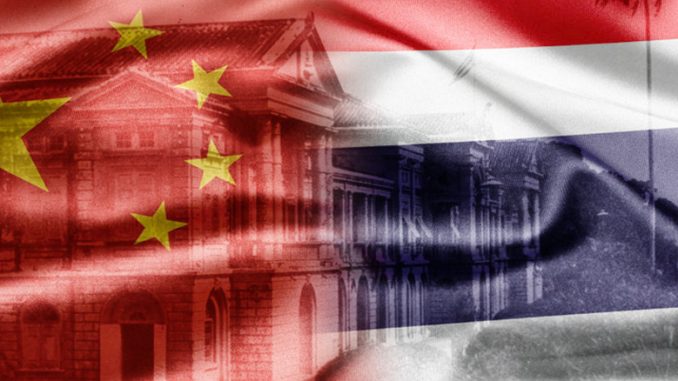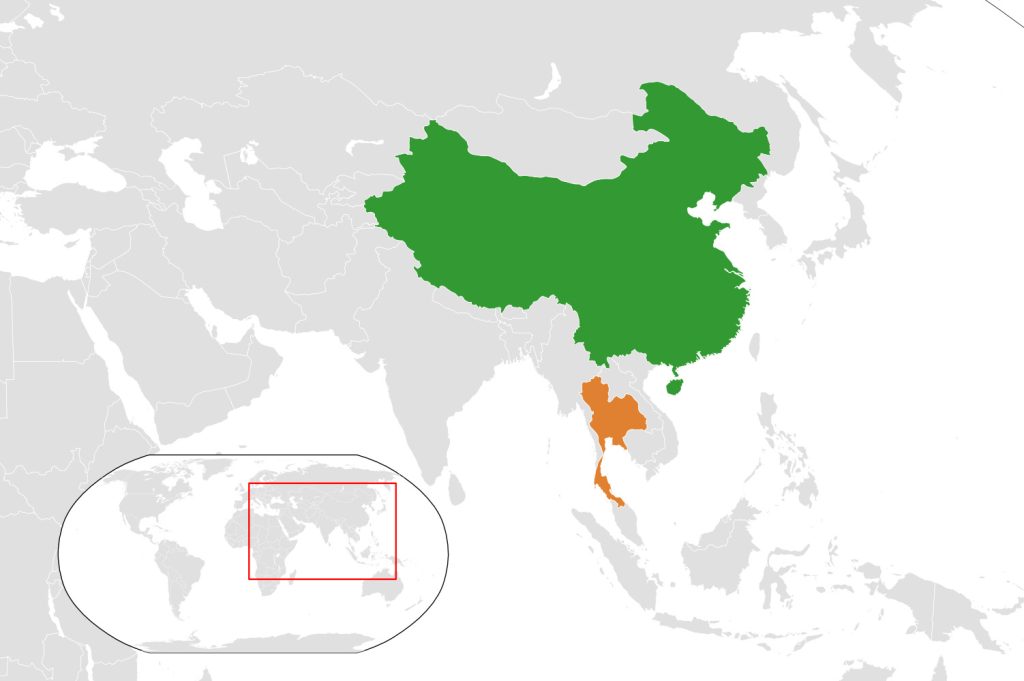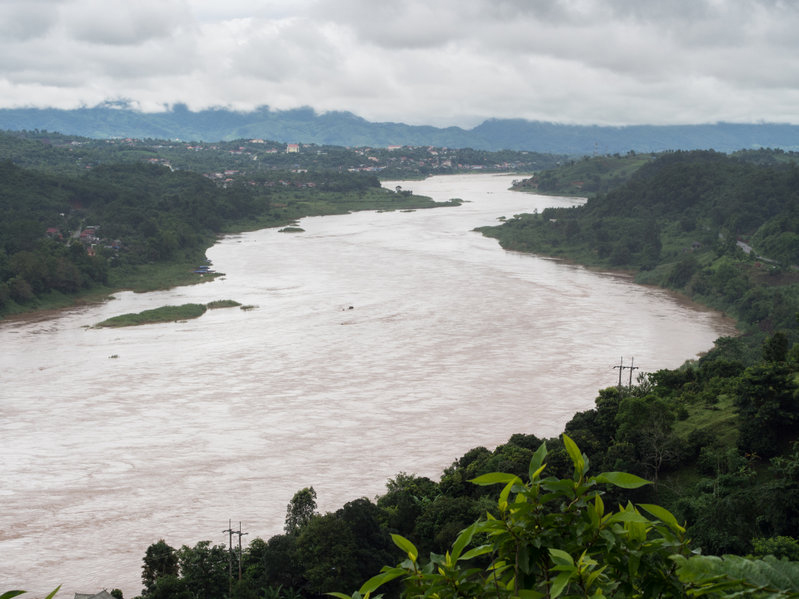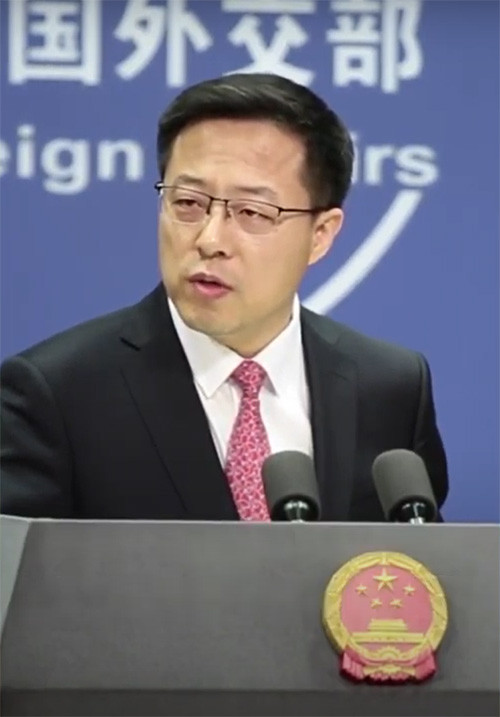
Who’s a Threat?
When an expert on Thai foreign policy discusses the trends in international affairs, one of the issues that has always been brought to the fore is unsurprisingly about the position of Thailand towards the Sino-American struggle for supremacy in Asia, if not in the world. Given the fact that the Americans have been gradually reducing their role in the Middle East in recent years, their next grand strategy seems to be Asia-centric as in the example of how former US president Donald Trump launched the Indo-Pacific strategy. Similarly, the current president of the United States, Joe Biden, repeatedly shows signs of interest towards Asia as well.
Speculations regarding such developments in the world will always be made by analysts on Thailand so that the Thai officials can pursue the best course of foreign policy. Given a choice between China and the US, it is often suggested that the Thai government should strive to balance the relationship between these two great powers. This belief stems from an old adage widely circulated among the Thai diplomatic corps that a ‘friend today can be an enemy tomorrow.’
Unlike any other advice, this short article argues that the Thais should pick a side in the current age of the Sino-American rivalry. It suggests that the Chinese, not Americans, are the clear threat to Thailand’s security, status, and even liberal-democratic values. This article starts by laying out a guideline to assess whether China or the US is more of a threat to Thailand. It then draws on developments from 2020 to 2021.

A Threat within Reach
To identify which power is a clear threat to Thailand, it is necessary to revisit a three-decade-old theory put forth by Stephen M. Walt. In what is labelled as a ‘balance of threat theory,’ Walt poignantly observes that a state tends to balance against a threat as opposed to power. In this regard, even though some great powers accumulate greater capabilities than others, they are not necessarily a threatening force to the others. Walt offers four factors to identify potential sources of threat to one’s security. 1 Such factors can be listed as follows: (1) ‘aggregate power (total resources such as population, size of geography, economic prowess, and technological advancement)’; (2) ‘offensive capability’; (3) ‘geographical proximity’; and (4) ‘offensive intention.’
While it is quite obvious that the US and China equally fit in the first and second factors (both nations maintain aggregate power and offensive military capability such as nuclear weapons), it becomes quite challenging to determine whether the Americans or Chinese are a potential threat to Thailand through the third and fourth factors. At the outset, the factor of geographical proximity indicates that China can be more threatening to Thailand’s security than the United States. This is quite logical: why would a country in North America be a threat to Southeast Asian security? What could be the worst-case scenario that the US could jeopardise countries in Asia apart from military disengagement from the region?
On the contrary, the absence of the US military in Asia would allow the Chinese aggrandisement to grow without limits. For example, in October 2021, President Biden vowed to defend Taiwan if China decided to invade the island. 2 Biden’s firm commitment came as a result of China’s series of provocations to unite the island by force and Taiwanese president Tsai Ing-wen’s inexorable stance on her country’s sovereignty. It is also because of the assurance of the US government to protect the freedom of navigation in South China Sea that has deterred the Chinese from engulfing the vital sea-lane in East Asia.
In Thailand, some policymakers and far-right supporters prioritised the relationship with China over America. Kasian Tejapira, a political science professor, characterises the right turn towards China as part of four ideologies: ‘anti-Western nationalism’; ‘Sino-centric globalism’; ‘unashamed parasitic opportunism’; and ‘simple-minded copycat authoritarianism.’ 3 Even Prime Minister of Thailand Prayuth Chan-ocha explicitly mentioned to Time magazine that China is Thailand’s ‘number one partner.’ 4 Leaning towards China without recognising them as a possible threat in close proximity is not only myopic but also precarious for Thai foreign policy in the long run.
Historically speaking, mainland China has been a menace to Thailand in comparison to the United States. In the pre-modern era, Thailand (or Siam) was subject to the tributary relations with the Middle Kingdom. During the interwar periods, the issue of Chinese immigrants was a source of concern for the Thai officials. From 1950 to 1975, China’s policy of exporting communism presented a grave danger to the Thai polity during the Cold War. Regaring the United States, its military presence was a bulwark against communism. Thus, when Richard Nixon withdrew the troops from Southeast Asia, Thailand’s security was imperilled. In other words, it is the American assertiveness in Thailand, not the other way around, that stabilised the country and region. While it is true that the United States was unsympathetic to Thailand during the 1997 Asian financial crisis, the American government was nothing more than a distant acquaintance whose interest lied elsewhere. They cannot pose threats to Thailand due to the geopolitical distance between the two countries.
One on-going geographical conflict that might arise in the future is the drought in the Mekong river, which was caused by China’s 11 dams constructed in the upper stream. Although the Chinese officials repeatedly deny that the 11 dams were responsible for water shortage during the dry season, a study claims that the Chinese dams have been worsening the water situation in the lower Mekong. 5 Despite some activist movements from the Thai side, there has been no substantial discussion from the Thai government to pressure the Chinese counterpart to settle this issue.
Geography is fundamental to structuring the relationship between countries because it cannot be altered. A good neighbouring country is a nightmare when it becomes hostile. An evil country from a great distance can be upsetting, but not haunting. From this angle, China should be marked as more intimidating than the US.

A Threat to Core Values
Since the 1990s, China has always prided themselves for their policy of non-interference in domestic affairs of other countries. Such a myth might be increasingly difficult to sustain in light of recent developments.
Since early 2020, Thailand, like any other nations, was affected by the spread of Covid-19. Despite the harsh condition of the pandemic, the anti-government protesters took to the streets to demand the resignation of Prime Minister Prayuth. The central agenda of these youth-led movements was to call for a major democratic reform of the Thai political system. Several tactics of these pro-democracy movements were inspired by the Hong Kong protests famously led by Joshua Wong. These movements were part of a loosely formed coalition called ‘Milk Tea Alliance,’ which was a virtual network composed of people from Hong Kong, Taiwan, and Thailand who have campaigned against authoritarianism.
Some Chinese media viewed the democratic trend with suspicion. Global Times, the Chinese government-sanctioned paper, published a report accusing that the democratic movements in Thailand ‘have some connections with the United States’. 6 Another similar report even falsely indicated that some unidentified Westerners instructed students in Thailand to set up stages and barricades. The author explained that the anti-government demonstrators ‘colluded with the United States and other Western countries’ to bring about Western proxies to govern the country.’ 7
Although the evidence incriminating China’s interference is unclear, its view towards democratic movements in Thailand is not favourable. Since the 2014 coup that installed Prayuth in power, the Sino-Thai relations have been closely aligned more than ever. Thailand’s arms deals with China have also increased at an amazing rate. An expert points out that Chinese arms sales to Thailand would translate into influence within the Thai army because the Thais would be dependent on the Chinese for spare parts and maintenance. 8 If Prayuth’s military-backed government is pro-Chinese, the democratic movements that defy the Thai authoritarianism are also a challenge to Chinese clout in Thailand.
Moreover, Thailand’s policy in relation to the Covid-19 vaccines can testify to the possibility that China is inimical to democratic values. In early 2021, the pseudo-democratic government of Thailand obsessively acquired the Oxford-based AstraZeneca and Chinese-made Sinovac vaccines. The Thai public perceptions towards the Chinese vaccines however are negative, especially among the pro-democracy factions. 9 While the import of both Pfizer and Moderna vaccines was strangely delayed in the second quarter of 2021, the Sinovac vaccines had been surging Thailand for more than 30 million doses. Thus, the opposition parties and democratic supporters in Thailand were suspicious of Bangkok’s collusion with Beijing over the vaccine deals.
In the parliamentary debate in September 2021, Thailand’s Prime Minister, Public Health Minister, and Parliamentary Chairperson warned the opposition parties to refrain from discussing the inefficacy of Sinovac lest it could jeopardise bilateral relations with Beijing. 10 This incident was incredulously blasphemous because the National Assembly of Thailand should represent the interest and safety of the Thai people. The far-right politicians were never restricted to pin the blame on the United States. Why then would it matter for the critics to claim that the Sinovac deal was a failure? The only possible reason could be that the Prayuth regime understood that the Chinese government could be more terrifying than the US. As such, maintaining a stable relationship with Beijing and suppressing critics of Sinovac were Prayuth’s top agenda.

On the social media front, China pursued what some might call ‘wolf-warrior diplomacy’. In general, the wolf warriors or Chinese diplomats have been actively spreading combative and aggressive words throughout their social media channels. On the ‘Chinese Embassy Bangkok’ Facebook page, for instance, the Chinese envoys staged a dirty campaign, alleging the United States as potential perpetrator behind the pandemic outbreak. 11 In response to Sinovac hesitancy, the Chinese embassy announced on its Facebook account on September 3 that those criticising the efficacy of the Sinovac vaccines could erode the Sino-Thai relations. To further aggravate the situation, China presumably sponsored the article published in Bangkok Post to accuse the US for concocting the ‘origins of the virus’ narrative. Such an article was published on the website of the Chinese Embassy in Thailand as well. 12
On the surface, China’s wolf-warrior strategy in Thailand was a battle against the United States. Nonetheless, that very battle took place on Thailand’s soil. Foreign diplomats residing in foreign countries traditionally respect the sovereignty of their hosts. Contrary to established customary practice, the Chinese wolf warriors designated Thailand as their battleground. What was even worse was Thailand’s non-reaction to China’s adventurous ploy. There was no report of how the Ministry of Foreign Affairs of Thailand might warn the Chinese embassy to tone down their abrasive display.



How to Deal with the Threat?
It is fairly adequate from the aforementioned analysis that China might be more threatening than the US. Recognising China as a prime threat is not the equivalent of severing diplomatic ties. It is however imperative for Bangkok to balance against them by approaching Washington to play part in this triangle game.
Recent developments in the region signified that the Americans’ target would be Asia. In September 2021, President Biden inked the trilateral security agreement with the United Kingdom and Australia, which is widely known as ‘AUKUS.’ In this historic partnership, the United States would support Australia in acquiring the nuclear-powered submarines. In March 2021, the spirit of the Quadrilateral Security Dialogue (QUAD) was renewed by its four members, the US, India, Japan, and Australia. Both the AUKUS and QUAD are the two initiatives formed to counter China’s aggression in Asia-Pacific. Thailand’s choice is to tilt towards the United States to create the equilibrium in Southeast Asia.
In foreign policy thinking, if one is a realist, China is an absolute threat to Thailand’s security due to its geographical proximity; if one is a liberal, China’s influence in Thailand is even more dangerous to the core values upheld by any democratic movements.
Peera Charoenvattananukul
Peera Charoenvattananukul is Lecturer in international affairs, Faculty of Political Science, Thammasat University
Notes:
- Stephen M. Walt, “Alliance Formation and the Balance of World Power,” International Security Vol.9, No.4 (1985): 3-43. ↩
- Stephen McDonell, “Biden Says US will Defend Taiwan if China Attacks,” BBC, October 22, 2021, https://www.bbc.com/news/world-asia-59005300. ↩
- Kasian Tejapira, “The Sino-Thais’ Right Turn towards China,” Critical Asian Studies Vol.49, No.4 (2017): 606-618. ↩
- Charlie Campbell, “Exclusive: Thailand PM Prayuth Chan-ocha on Turning to China over the US,” Time, June 21, 2018, https://time.com/5318224/exclusive-prime-minister-prayuth-chan-ocha-thailand-interview/. ↩
- The Economist, “The Shrinking Mekong: Southeast Asia’s Biggest River is Drying up,” The Economist, May 16, 2020, https://www.economist.com/asia/2020/05/14/south-east-asias-biggest-river-is-drying-up. ↩
- Yang Sheng, “HK Rioters Criticized for Meddling in Thai Protests,” Global Times, October 20, 2020, https://www.globaltimes.cn/content/1204125.shtml. ↩
- Yu Qun, “Behind-scenes Funding of Thailand Protests Show invisible Western Hands,” Global Times, October 21, 2020, https://www.globaltimes.cn/content/1204212.shtml. ↩
- Ian Storey, “Will the Covid-19 Crisis Affect Thai-China Defence Cooperation?,” Institute of Southeast Asian Studies, May 29, 2020, https://www.iseas.edu.sg/media/commentaries/will-the-covid-19-crisis-affect-thai-china-defence-cooperation/. ↩
- Khairulanwar Zaini and Hoang Thi Ha, “Understanding the Selective Hesitancy towards Chinese Vaccines in Southeast Asia,” Institute of Southeast Asian Studies, September 1, 2021, https://www.iseas.edu.sg/articles-commentaries/iseas-perspective/2021-115-understanding-the-selective-hesitancy-towards-chinese-vaccines-in-southeast-asia-by-khairulanwar-zaini-and-hoang-thi-ha/. ↩
- Aekarach Sattaburuth, “Prayuth Defends Govt Virus Crisis Handling,” Bangkok Post, August 31, 2021, https://www.bangkokpost.com/thailand/politics/2173619/censure-debate-kicks-off. ↩
- Chinese Embassy Bangkok Facebook page on August 23, 2021. ↩
- Bangkok Post, “The US ‘Assessment on Covid-19 Origins’ Infected by the Political Virus is No Way Credible,” Bangkok Post, August 30, 2021, https://www.bangkokpost.com/business/2173487/the-us-assessment-on-covid-19-origins-infected-by-the-political-virus-is-in-no-way-credible.; See also Spokesperson of the Chinese Embassy in Thailand, “The US ‘Assessment on Covid-19 Origins’ Infected by the Political Virus is No Way Credible,” Embassy of the People’s Republic of China in the Kingdom of Thailand, August 30, 2021, http://www.chinaembassy.or.th/eng/gdxw/t1903063.htm. ↩
